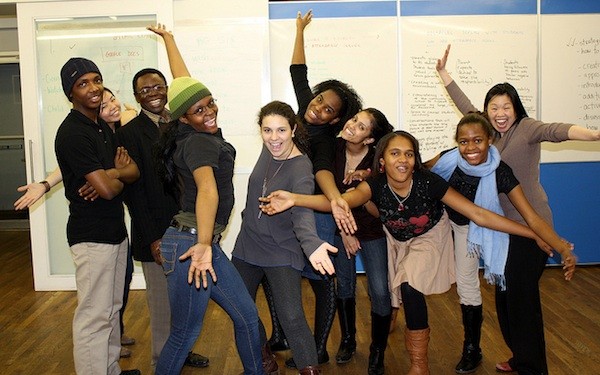"We are Meant to Pulse"

Topping the new recommended resources list from Global Kids is "Gaming to Re-engage Boys in Learning," a provocative video looking at the discrepancies in performance and achievement between boys and girls aged 3 to 13 and discussion of why school culture itself may be alienating to male students. Central to instructional designer Ali Carr-Chellman’s arguments are the lack of male representation in teaching, zero tolerance policies that disproportionately affect boys and the anti-gaming rhetoric of some schools that is hostile to youth invested in game culture. Though Carr-Chellman sidesteps the broader issue of what social factors might precipitate differing behaviors in boys and girls and how schools might address this difference, the statistical evidence she presents is startling and an entry point for further discussion.
Jane McGonigal hits New York Public Library in new game (article)
CNET covers the New York Public Library’s countdown to an upcoming Augmented Reality Game to be played overnight by 500 contestants next month. The mobile-based game, “Find the Future,” is cast as an epic mystery-adventure through the NYPL’s historic main branch Library at Bryant Park. While the game is aimed at an adult audience, the experience, captured in words by the players will become public on May 21 for bibliophiles of all ages to play on the NYPLs website at game.nypl.org. Another example of the NYPL’s continued commitment to innovative use of socially-relevant gaming is our recent collaboration, “NYC Haunts,” a 12-week program where Bronx middle schoolers will take inspiration from their neighborhood’s history to create their own location based ARG at a local branch library using the iPad 2 and the mobile platform SCVNGR.
Is Second Life Still Relevant? (blog post)
Online education strategist John “Pathfinder” Lester addresses a question we get asked at Global Kids on a weekly basis: Is Second Life still relevant? In fact, it’s as relevant as ever, and Lester makes a strong case in this post. Lester contrasts social media with virtual worlds -- “Lightweight social media platforms are like magazines. Virtual Worlds are like participatory theater” -- then argues, “We’re already living in a virtual world that is partially collapsed into our physical world. We just don’t notice it.” Global Kids has developed programs for more than five years in Second Life, and is about to start a program in which high school youth will run their own virtual talk show, for an audience of their peers, interviewing STEM-related professionals on issues related to global sustainability. In fact, you can watch a recent talk I gave within Second Life eulogizing the recent closing of Teen Second Life, speaking over the open casket of my Teen Grid Avatar who, halfway through, rises to talk over the presentation.
Survey Shows Teachers Are Increasing Their Reliance on Free Educational Resources (study)
PBS and Grunwald Associates LLC’s new national research report on teacher’s media usage called “Deepening Connections: Teachers Increasingly Rely on Media and Technology” shows that 97% of K-12 teachers use digital media for classroom instruction, but there is not enough infrastructure to support this activity. More than half of the teachers reported decreasing media budgets in their schools, which has resulted in teachers relying more on free content. Teachers are spending 60 percent of their time using educational resources in the classroom that are either free or that they paid for themselves. Global Kids continues to seek funds to expand its professional development offerings and online resources for educators in order to make available free and quality resources for educators wherever possible.
SXSW 2011: The Internet is Over (article)
Each year South by Southwest Interactive becomes a venue for introducing new digital media tools or ideas. Years past have given us Twitter and Foursquare. Guardian writer Oliver Burkeman offers an excellent overview of the main memes to come out of the event (you can tell most are memes as they have quotes around them): “Web 3.0." the “Game Layer," the “Dictator's Dilemma," Biomimicry, and "We are meant to pulse."
InfoWhelm and Information Fluency (video)
This video from the 21st Century Fluency Project, talks about how we live in an age of 24/7 “infowhelm," where we are bombarded with information, have an increasingly high digital output and are challenged to manage our attention and develop deep expertise. It then makes the case that education can no longer be focused on memorization and regurgitation of information, but should require a new set of “information fluency” skills that includes the ability to ask good questions, access information from appropriate sources, analyze fact from opinion, and apply real world problems. Global Kids builds on the “information fluency” framework by providing students with 21st century skills through its experiential and interactive programs that engage youth about real-world issues.
Latinos and Digital Technology, 2010 (study)
A recent study based on two national surveys by the Pew Hispanic Center found that Latinos lag behind whites in Internet use, home broadband access and cell phone ownership. Latinos lag behind blacks in home broadband access, but have similar rates of Internet and cell phone usage. Latinos, however, are more likely than whites to access the Internet from a cell phone instead of through a home connection. Global Kids is continuing to explore how mobile phones can civically engage youth to connect with their local and global communities. Studies like this one are invaluable and inform our work as we identify and address the real challenges of the “digital divide” and “participation gap” that exists.
Global Kids does a great job mining the 24/7 flow of resources coming out of the digital media and learning field. They share some of their favorites each month. Please tell us what you're reading or watching and why others should as well! Global Kids' NYC-based programs address the need for young people to possess leadership skills and an understanding of complex global issues to succeed in the 21st century workplace and participate in the democratic process.
Banner image credit: Global Kids http://www.flickr.com/photos/holymeatballs/5526812430/
Comments